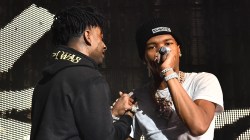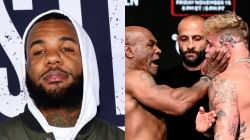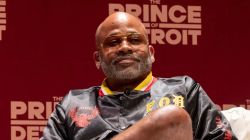It’s been eight years since Juvenile performed live in New York City – about the same time since his last Cash Money Records release, Juve The Great. There, on stage this week murdering lower Manhattan’s renowned SOBs night club – tan Yankee-fitted rocked in respect, famed custom grill blinging in every lyric, easily commanding the world’s most critical Hip Hop connoisseurs – Juvie was just that: great. He opened with beloved B-side “400 Degreez,” dropped a couple of rump shaking singles (“Set It Off” and “Slow Motion”) before closing out with classics, “Back That Azz Up” and “Ha.” The anthems ignited the audience, expectedly. But it’s immediate embrace of new offerings “Power” and “Mardi Gras” is arguably the truest testament to the Magnolia Soulja’s mighty legacy. Fourteen years since first introducing the world to CMB and Juvenile’s music still resonates.
HipHopDX caught up with Juvenile for a few moments following his SOBs performance. In this exclusive interview, the New Orleans pioneer describes the skepticism received when he first signed with Cash Money Records, being the only Hot Boy listening to East Coast Hip Hop, Rejuvenation, and why this industry is “five percent talent and 95 percent business.”
HipHopDX:400 Degreez is one of those albums that has defined my life from college to adulthood. I really appreciated you opening up with [the title track] “400 Degreez” tonight.
Juvenile: Yeah, man. That’s the one. I feel like it all started from that. I’m just happy to be here in New York and see the people come out and celebrate the whole [Juvenile] movement. It was a good look for me, man. Totally. The whole trip down here, honestly – from the time I landed in the airport for the first interview to now – everything’s just went wonderful.

AD LOADING...
DX: I always wondered what it must’ve felt to be Juvenile in the early 1990s. With the success of No Limit [Records] and Cash Money [Records] as organizations, sometimes it seems like your legacy has been narrowed a bit. You are the true pioneer coming out of New Orleans – “Bounce With A Juvenile,” the whole Bounce scene. You sold hundreds of thousands of records before No Limit or Cash Money even existed.
Juvenile: True. When I first signed with Cash Money [Records], a lot of people in New Orleans felt like I was going backwards. I was a regional artist. I had a deal with a label in New York called Warlock [Records]. They were like, “Why would you sign to Cash Money?” I said, “Hey man, I see it. You probably don’t see it, but I can hear myself on Mannie Fresh’s beats.” They had something that I was interested in. I knew Mannie Fresh was the only cat in New Orleans that was making music that fit me to the fullest. I kind of rapped over everybody’s beat he was making tracks for. If a song came out that he produced, I tried to rap over it and see how I would sound. It was kind of a blessing in disguise for me, but everybody just couldn’t see it. Now they know.
DX: You closed out your set tonight with “Ha.” The “Ha (Remix)” featuring Jay-Z, is one of those watershed moments in Hip Hop. I think about that track in a similar manner to Bone Thugs-N-Harmony and The Notorious B.I.G. on “Notorious Thugs.” That was a brand new flow for Jay-Z at that time.
Juvenile: I didn’t think that was going to happen. I was shocked myself. Seriously, man, [Jay-Z’s] Reasonable Doubt, I was tripping of it. When I got to Cash Money, they were on some Dr. Dre [influences] and listening to only West Coast music. They didn’t listen to East Coast music. Here I come – camouflaged down, wearing Timberlands – listening to Jay-Z. They were like, “Man, why you listening to that?” I was like, “Man, I like listening to what he’s saying. What he’s saying is what I relate to. This is what’s going on with me.” I didn’t have the money and all that, but sometimes when he speaks on his past, he just touched right there where I’m at. I think he’s one of the greatest. I just feel like that [“Ha” Remix] was a blessing.

AD LOADING...
DX: Your next album is called Rejuvenation. What does that title mean for Juvenile the artist?
Juvenile: It’s the start of my new era. It’s one album of many, first of all. I got a lot of material, so it’s one album of many. My next move is the Juvie, Wacko, and Skip [UTP] project. I’m working with this new cat named August Alsina – an R&B artist that sings like crazy. When you hear him, you’ll know. I’m just doing multiple things right now. I’m trying to evolve into the record company mogul like my man Russell Simmons. I don’t wanna rap the rest of my life.
DX: You’ve said that the toughest point in your career was the first three years after you left Cash Money – when you were really on your own. Now sonically to a degree, your career has come full circle. Seventy percent of the tracks on the upcoming album are produced by Mannie Fresh. What do you impress upon your younger artists in UTP that you mentor? What do you teach them about this industry?
Juvenile: In some situations you’ve got to learn from your own experiences. But with me, I just try to explain to them that it’s really 5% talent and 95% business. It’s all about putting yourself in the right situation and marketing yourself right and surrounding yourself with good people. It’s staying away from things that’s gonna cause negativity in what you’ve got going on. It’s all about making the right decisions because a three second mistake can mess up the rest of your life. I try to make them pay attention to what’s going on in the world and take heed to that and make sure they’re doing the right thing.



